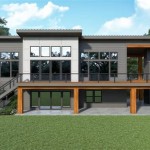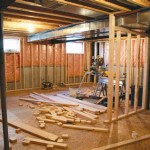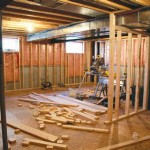A Guide to the Essential Aspects of a House with a Basement
When considering purchasing or building a home, one of the key decisions you'll face is whether or not to opt for a basement. While basements can offer a range of benefits, they also come with specific maintenance and structural considerations. In this article, we'll delve into the essential aspects of a house with a basement, helping you make an informed decision that meets your needs and preferences.
Benefits of a Basement
- Additional Living Space: Basements provide valuable extra space that can be transformed into bedrooms, living areas, or home offices, expanding your home's functionality.
- Storage: With ample space and customizable configurations, basements can become excellent areas for storing seasonal items, appliances, and other belongings.
- Climate Control: Basements are typically cooler in summer and warmer in winter, offering a more comfortable environment for living and storage.
- Value Addition: A well-finished basement can increase the overall value of your home, providing a return on your investment.
Structural Considerations
- Foundation: A basement requires a strong foundation that can withstand the weight of the structure and soil load. Proper drainage systems should be installed to prevent water seepage.
- Walls: Basement walls need to be waterproofed and reinforced to ensure stability and prevent moisture damage.
- Windows and Doors: Proper installation of windows and doors is crucial for ventilation, natural lighting, and emergency egress.
- Ceiling Height: Ensure the basement has ample ceiling height to avoid feeling cramped or claustrophobic.
Maintenance Considerations
- Moisture Control: Basements are prone to moisture accumulation. Proper ventilation, waterproofing, and drainage systems are essential to prevent mold, mildew, and structural damage.
- Heating and Cooling: Basements require proper heating and cooling systems to maintain comfortable temperatures year-round.
- Inspection and Maintenance: Regular inspections and maintenance are crucial to ensure the basement's structural integrity and prevent costly repairs.
- Emergency Preparedness: Consider the basement's role in an emergency, such as flooding or natural disasters. Ensure it has a safe exit strategy and necessary supplies.
Specific Considerations for Finished Basements
- Lighting: Incorporate ample natural and artificial lighting to create a comfortable and inviting living space.
- Flooring: Choose flooring materials that are durable, moisture-resistant, and aesthetically pleasing.
- Soundproofing: Consider soundproofing measures to minimize noise transmission between the basement and living areas above.
- Safety Features: Install smoke and carbon monoxide detectors, emergency lighting, and an exit plan for added safety.
Conclusion
Deciding whether a house with a basement is right for you requires careful consideration of your needs, budget, and lifestyle. If you prioritize additional living space, storage capacity, and potential value addition, a basement can be a valuable asset. However, it's essential to address structural and maintenance concerns to ensure the basement's longevity and safety. By weighing the benefits and considerations outlined in this article, you can make an informed decision that will enhance your home ownership experience.

Basement Attic Houselogic

Should You Get A Basement Extension In 2024

Do You Need A Basement In Your New House Plan Abhp America S Best Plans Blog

Grandpa S Basement House

Should A House Design Have Basement Cement Production Plants Long Son

Why Some Southern States Don T Have Basements Rg Smith Company

Common Basement Types Found In Homes Across The Us

Basement Extension Have You Ever Thought About Adding A Urbanist Architecture Small Company London

Stylish And Smart 2 Story House Plans With Basements Houseplans Blog Com

Exploring The Pros And Cons Of A Basement Foundation In Boulder High Performance Earthworks
See Also








